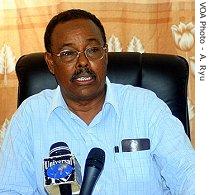2007年VOA标准英语-Somali Peace Conference Delayed One Month(在线收听)
Mogadishu
13 June 2007
For the third time in three months, organizers of Somalia's national reconciliation conference, due to begin this week in the capital, have postponed the talks. As VOA Correspondent Alisha Ryu reports from Mogadishu, Somalis had widely expected another delay.
 |
| Ali Mahdi Mohamed announces delay of the reconciliation talks, 13 Jun 2007 |
The chairman says the committee received a request to delay the talks from several clan elders, who have not finished selecting their delegates to the conference. He also says the venue for the talks has not yet been fully constructed.
Mohamed says the conference will begin on July 15.
The talks were first postponed in late April and then again in mid-May because of violence in the capital. This time, the government says a lack of funding from donor nations is largely to blame.
The transitional federal government estimated that it needed more than $35 million to host 3,000 delegates. But the national reconciliation committee reduced the delegate number to 1,325, saying it did not receive the money the committee needs.
In an interview with VOA two days ago, committee chairman Mohamed said donor nations only released $4.5 million, and he hinted the conference would be delayed.
"We tried to get the money as soon as possible, but it was impossible," he said.
Six months ago, military support from Ethiopia and political and economic support from western nations helped the secular government oust Somalia's rapidly expanding Islamist movement from power.
Since then, key international donors, such as the United States and the European Union, have been urging the Somali government to hold a broad-based, transparent reconciliation conference including not only clan leaders, but also political opponents.
During an unannounced visit to Mogadishu last week, U.N. Under-Secretary General for Political Affairs, B. Lynn Pascoe, bluntly told interim leaders that the international community is willing to help the government, as long as it shows a genuine willingness to work with all Somali groups.
Government leaders insist that they have opened the conference to everyone, including Islamists, who can participate not as a political group, but individually through their clans.
But anger over the continuing Ethiopian-troop presence in Somalia and accusations that the government lacks transparency and fairness are severely hampering efforts to end the country's 16-year-old civil war.
And an apparently reinvigorated radical Islamist movement spreading in the capital and elsewhere in the country has led many Somalis to fear that holding reconciliation talks could lead to more violence, not less.